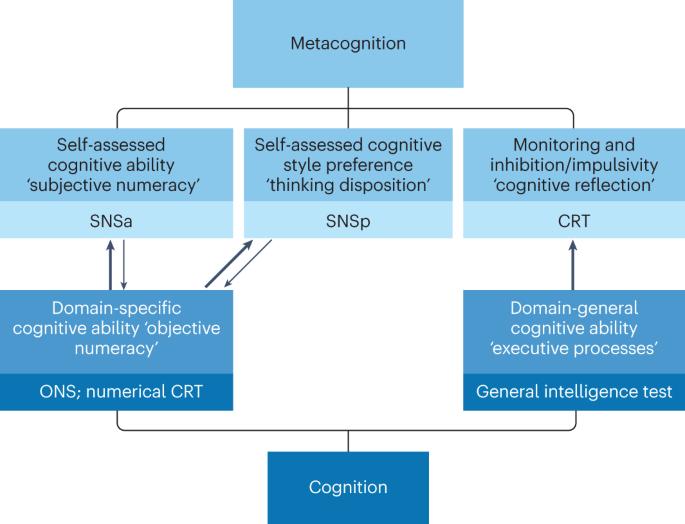Numeracy, gist, literal thinking and the value of nothing in decision making
IF 16.8
Q1 PSYCHOLOGY, MULTIDISCIPLINARY
引用次数: 2
Abstract
The onus on the average person is greater than ever before to make sense of large amounts of readily accessible quantitative information, but the ability and confidence to do so are frequently lacking. Many people lack practical mathematical skills that are essential for evaluating risks, probabilities and numerical outcomes such as survival rates for medical treatments, income from retirement savings plans or monetary damages in civil trials. In this Review, we integrate research on objective and subjective numeracy, focusing on cognitive and metacognitive factors that distort human perceptions and foment systematic biases in judgement and decision making. Paradoxically, an important implication of this research is that a literal focus on objective numbers and mechanical number crunching is misguided. Numbers can be a matter of life and death but a person who uses rote strategies (verbatim representations) cannot take advantage of the information contained in the numbers because ‘rote’ strategies are, by definition, processing without meaning. Verbatim representations (verbatim is only surface form, not meaning) treat numbers as data as opposed to information. We highlight a contrasting approach of gist extraction: organizing numbers meaningfully, interpreting them qualitatively and making meaningful inferences about them. Efforts to improve numerical cognition and its practical applications can benefit from emphasizing the qualitative meaning of numbers in context — the gist — building on the strengths of humans as intuitive mathematicians. Thus, we conclude by reviewing evidence that gist training facilitates transfer to new contexts and, because it is more durable, longer-lasting improvements in decision making. Individuals frequently lack the ability and confidence to make sense of quantitative information in their decision making. In this Review, Reyna and Brainerd describe how numeracy training emphasizing the qualitative meaning of numbers in context — the gist — can create substantial and long-lasting improvements to numeracy abilities that transfer across contexts.

算术、要旨、字面思维和决策中的无价值。
普通人比以往任何时候都更有责任理解大量易于获取的定量信息,但他们往往缺乏这样做的能力和信心。许多人缺乏实用的数学技能,而这些技能对于评估风险、概率和数字结果至关重要,例如医疗的存活率、退休储蓄计划的收入或民事审判中的金钱损失。在这篇综述中,我们整合了对客观和主观算术的研究,重点关注扭曲人类认知并在判断和决策中引发系统偏见的认知和元认知因素。矛盾的是,这项研究的一个重要含义是,对客观数字和机械数字运算的字面关注被误导了。数字可能是一个生死攸关的问题,但一个使用死记硬背策略(逐字逐句表达)的人不能利用数字中包含的信息,因为从定义上讲,“死记硬记”策略是没有意义的处理。逐字表述(逐字只是表面形式,而不是意义)将数字视为数据,而不是信息。我们强调了一种对比鲜明的要点提取方法:有意义地组织数字,定性地解释它们,并对它们做出有意义的推断。提高数字认知及其实际应用的努力可以受益于在上下文中强调数字的定性含义——这是建立在人类作为直觉数学家的优势之上的要点。因此,我们通过审查证据得出结论,即要点训练有助于转移到新的环境中,并且因为它更持久,所以在决策方面有更持久的改进。
本文章由计算机程序翻译,如有差异,请以英文原文为准。
求助全文
约1分钟内获得全文
求助全文

 求助内容:
求助内容: 应助结果提醒方式:
应助结果提醒方式:


